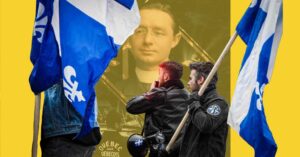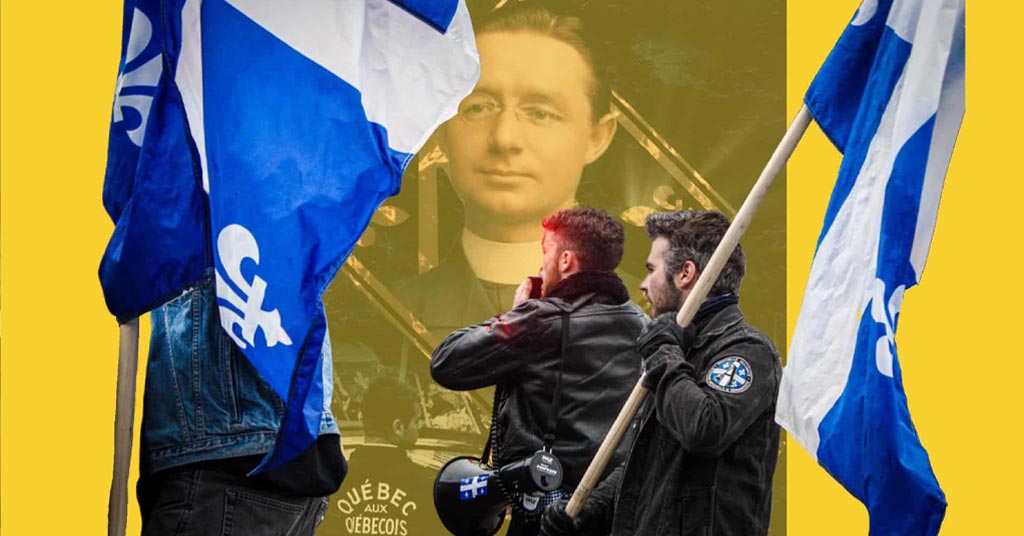
A New Group in Québec is Uniting Young Separatists Under Identitarian Ethnic Nationalism
Nouvelle Alliance is promoting an identitarian, ethnic nationalism using imagery that draws inspiration from the far-right
This article was originally published by Pivot, an independent, non-profit francophone news outlet based in Québec — PressProgress and Pivot are working together to translate and republish each other’s stories.
Nouvelle Alliance is a separatist organization that has been active for over a year and a half. While the group claims it is neither left-wing nor right-wing, it proudly and openly presents itself as promoting an identitarian form of nationalism. Is this organization a “big tent” that could unite the separatist movement or a vehicle of the radical right seeking to “fool the unwary?”
In March 2022, a group of 20 young people — primarily men — held their first official meeting in Montréal. Since then, the group known as Nouvelle Alliance (NA) has founded local chapters in Sherbrooke and Québec City. Today, its membership has grown to more than 50.
In an interview with Pivot, François Gervais, the president of NA, explained that the group’s founding members had previously been active in a variety of nationalist organizations including the Société Saint-Jean-Baptiste, the Parti Québécois and the Bloc Québécois. In addition to these official organizations, several of the Nouvelle Alliance’s founding members were also active in the Front Canadian-Français, a small far-right ultra-Catholic organization.
“(Activism) in the more traditional organizations was often limited to social evenings … what some might refer to as armchair sovereigntists,” remarked Gervais. Because “comfort depoliticizes,” Nouvelle Alliance is trying to “bring the fight for independence into the streets,” to “take a more combative approach and, more importantly, … to stop waiting on politicians.”
In addition to getting activists into the streets, Nouvelle Alliance wants to “be the kind of big tent” that brings together separatists of all types and backgrounds.
This is what the group’s chosen name seeks to evoke, even as it carries echoes of the Alliance Laurentienne―a fascist separatist group active in Québec in the early 1960s.
Gervais is adamant that his group’s name isn’t intended to imply any link with the organization founded by Raymond Barbeau, although he admits having “drawn inspiration from certain aspects” of it. “Our name should be understood as exactly what it says: an authentic and veritable new alliance for separatists.”
Based on an analysis of Nouvelle Alliance’s discourse, University of Ottawa political science professor Jean-Pierre Couture made clear that, despite claims of bringing groups together, there are a “number of exclusions in this group’s unifying project.” Namely, decolonization and Indigenous resurgence, political separatism and the rule of law don’t seem to be a part of NA’s political program.
Identitarian, Ethnic and Patriotic Nationalism
Nouvelle Alliance’s nationalism is rooted in ethnic identity, distinguishing it from political or civic nationalism, which are based on citizenship and cohabitation.
In its manifesto, NA states that an independence movement without nationalism — defined as identitarian — is a “hollow shell.” For Gervais, this means that NA answers “every question according to the best interests of the nation.”
As such, his organization rejects any notion of independence that is not rooted in nationalism. As he says, “we want (independence) so that we can maintain our power, maintain our (French-Canadian) majority.”
The president of NA does concede that “you don’t need to be French-Canadian … to be a good patriot” and that “it’s entirely possible for someone who’s newly arrived to fully understand the identitarian dimension of our struggle and even to join it.” However, he also reiterated his belief that “all forms of nationalism start from an understanding that, at the source of every nation stands an ethnicity. It isn’t at all racist to recognize this fact and it’s the same for all peoples and every nation around the world.”
For his part, Couture finds it difficult to reconcile NA’s stated position of seeking an alliance among all strands of the separatist movement while, at the same time, forgetting “the many people in favour of a civic nationalism, with no ethnic basis, who would be called upon to vote ‘yes’ as part of the major project in question.”
As he puts it: “How can we convince those who aren’t a part of the stated ethnic identity to embrace the idea” of independence if it’s rooted in an identitarian or ethnic approach?
For NA, the ethnic identity of the majority is French-Canadian, the descendants of French colonists. Under an identitarian vision of nationalism, independence is a means of ensuring the primacy of French-Canadians over other groups within the territory of Québec. According to Gervais, “if we recognize (this right) for ourselves, we also recognize it for others. All peoples have a right to remain the majority in their own territory.”
Professor Couture explained how this vision of a single ethnicity protected by its own national state would be rather exceptional, as the vast majority of countries around the world are home to several nations. “If we look at the world, the most common position is actually to be an ethnic minority living under a majority that feels that it is more universal, more historic or more important.”
An End to the Rule of Law?
For the president of NA, an independent Québec would be able to guarantee that its laws are applied without fear of the Supreme Court overturning them in the name of minority rights.
“As its own country, Québec would be able to apply its laws within its jurisdiction, without interventions by the federal government,” explained Gervais.
He also made reference to possible challenges to Bill 21, prohibiting the wearing of religious symbols, and Bill 96, on the status of the French language, noting that “we would no longer need to be concerned by these types of situations.”
“It’s all well and good to say that everyone would be welcome, but (Nouvelle Alliance) is taking exactly the same position as Barbeau” and the Alliance Laurentienne, highlighted Couture. He went on to illustrate how Barbeau understood the primacy of the majority, citing him directly: “Minorities must not be allowed to denationalize, bastardize or negate the most sacred rights of the laurentienne nation.”
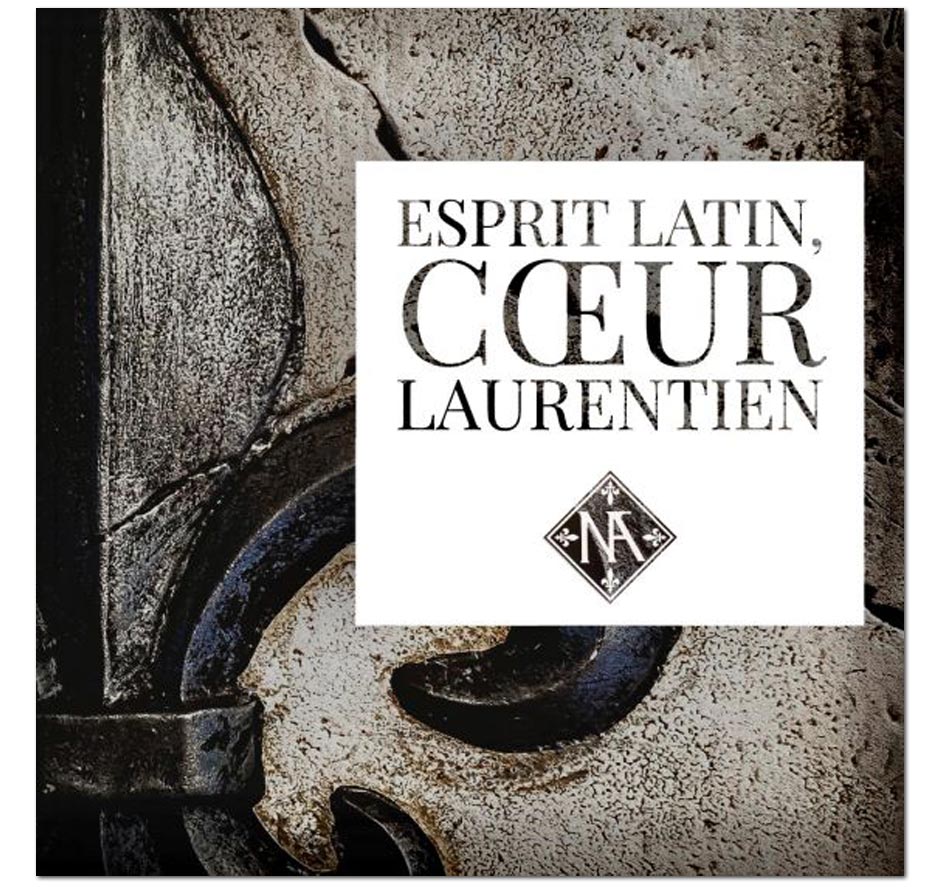
(Nouvelle Alliance, Facebook)
“It’s quite a vertical relationship with minorities,” notes Couture. For the political scientist, the very idea of a democratic nation instead implies the elimination of privileges and the defence of minority rights. “Democracy doesn’t mean majority. It means that no one should be unjustly or illegitimately dominated by their neighbour or by those with more power.”
Neither Left nor Right
Nouvelle Alliance describes itself as a “united” organization, intended to rally separatists of all political stripes. However, this apparent openness depends on accepting NA’s identitarian positions, limiting its audience.
As the president of NA explains it: “The fact of being conservative or progressive is secondary in so far as we recognize our responsibility toward history.”
It is this responsibility, according to him, that allows for a reconciliation between “trade unionists and people who go to mass on Sunday.”
By examining social media publications by the group and those sympathetic to it, we note the participation of young traditionalist Catholics, a singer from a punk band, a former Green Party candidate, a blogger and host of a “classically liberal” podcast, and even a representative of the youth wing for Rassemblement national, a far-right political party in France.
Based on their presence in the public space, NA does seem to lack any set ideological position, outside of its position on the national question.
On Le Debrief, a podcast hosted by Frank “le Dédômiseur,” NA co-founder Samuel Rasmussen reacted to an article by the Canadian Anti-Hate Network describing NA as a far-right organization, which he claimed was dishonest.
A group of young nationalists are proposing a “New Alliance” between left and right QC sovereigntists. Their leadership is almost exclusively formed by ex-members of a traditionalist Catholic group tied to antisemitism and racist conspiracy theories.
1/https://t.co/1C55tpJ3w6— Canadian Anti-Hate Network (@antihateca) July 29, 2022
He rejected the idea that the organization was far-right. “We’re against violence … and racial exclusion or any type of discrimination.” Rasmussen continued, saying that within “the group we have Catholics, we have young people who adhere to the ideas of Duplessis, etc. That’s fine… they have the right to express themselves. These people aren’t a danger to the public.”
Looking into the social media profiles of certain members, we can find quotes from Louis-Ferdinand Céline, a novelist and notorious anti-Semite, Ernst Jünger, a nationalist German conservative and Canon Lionel Groulx, an important figure in Québec’s nationalist conservatism.
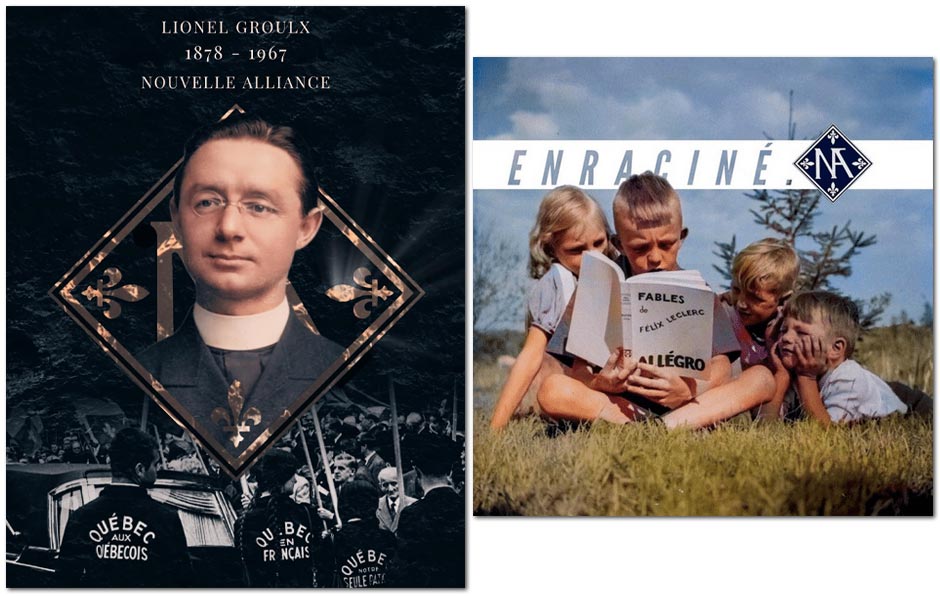
(Novelle Alliance, Facebook)
On the other hand, certain factions closer to the left seem to be less welcome within Nouvelle Alliance. A text reacting to graffiti that had been added to one of the group’s murals — under a phrase reading “I am a separatist,” someone had added “and socialist” — reads: “The far-left is always at the forefront of undermining the work of honest patriots, in the past and still today.”
On a separatist Facebook group, in response to a user who saw traces of “communism” in one of NA’s posts, the group responded that “we’re absolutely not Marxists.”
Under another post, where a user was concerned that “there are probably more QSists in the group than péquistes,” a member of NA responded: “I’m in Nouvelle Alliance and I can reassure you that there aren’t any ‘quistes among us.”
A Masculine Nationalism
NA is an organization composed primarily of young men. According to Gervais, the average age of its members is around 24.
When Pivot noted that its movement seemed very male-dominated, he responded through laughter, saying, “you’ve highlighted a really significant dilemma.” For him, every movement has a “target audience” and he was aware that “it is mostly young men who join (NA).”
There are women in NA, he said, even though they’re barely present in any photos published by the group. This is explained by the fact that many of them prefer not be included in the photos, according to the president.
He also hypothesized that “young female activists for independence (might) have a greater aversion to risks” and that this type of activism “is less in keeping with their fibre, or their nature.”
Shadows of the Front canadien-français
Before starting Nouvelle Alliance, François Gervais and at least two other founding members were active in an ultra-Catholic traditionalist group called the Front Canadien-Français (FCF), which was active for a brief period in 2020.
According to its website, which is now offline, this group founded its nationalism on “the principle that there are natural and immutable laws of nature that govern the history of Man” and lamented that “we, French-Canadians, have lost our faith and risk become a minority in our own country.”
The solution? A return to faith, a rejection of egalitarianism and “governance based on the social doctrine of the Church.”
“Most of the activists involved in this small group, the FCF, are now known,” Gervais admitted. “Their names and faces were revealed in a fairly malicious way.” This is in reference to an article published by Montréal Antifasciste on the group and the traditionalist Catholic movement in Québec.
“It’s true, I was a member of the group.” But, as a minority of NA members were previously involved in the FCF, Gervais insists that “it’s objectively false to say that Nouvelle Alliance is the political heir of Front Canadien-Français.”
Perplexing Images
The group’s actions to date have consisted in staging commemorations for historical individuals and events, putting up posters and placing banners.
The group is also “very interested in pyrotechnics,” according to its president. Smoke devices, hand-held flares and other accessories are regularly used to “set the scene,” “to be seen” and “for the look.”
The group’s first public demonstration was held in May 2022 to commemorate the execution of patriots at Pied-du-Courant.
Close to a dozen actions have been publicized on NA’s social media accounts in 2023. For example, NA organized several banner drops on July 1st. One of which involved members climbing the Alexandra Bridge, linking Gatineau and Ottawa.
On two occasions, NA activists have placed stickers saying “Arrêt” on stop signs written in English. The first time was in the Town of Mount Royal, in August 2022, and the second time in Lennoxville, in the Sherbrooke area, in July 2023. These actions got the group the most media attention, according to François Gervais.
Given that municipalities with an Anglophone majority have rights over signage, “it makes it clear that, for this fringe of the identitarian movement, minorities do not have any rights,” noted Jean-Pierre Couture. “When you want to rally as many people as possible to the cause of independence, and then you sacrifice Anglos from the very start … you send a very clear message that ‘when we win, you’re going to be left with nothing.’”
Nouvelle Alliance held a ceremony honouring Montcalm on September 10. Images of the event, shared online, show activists with flags and torches in hand.
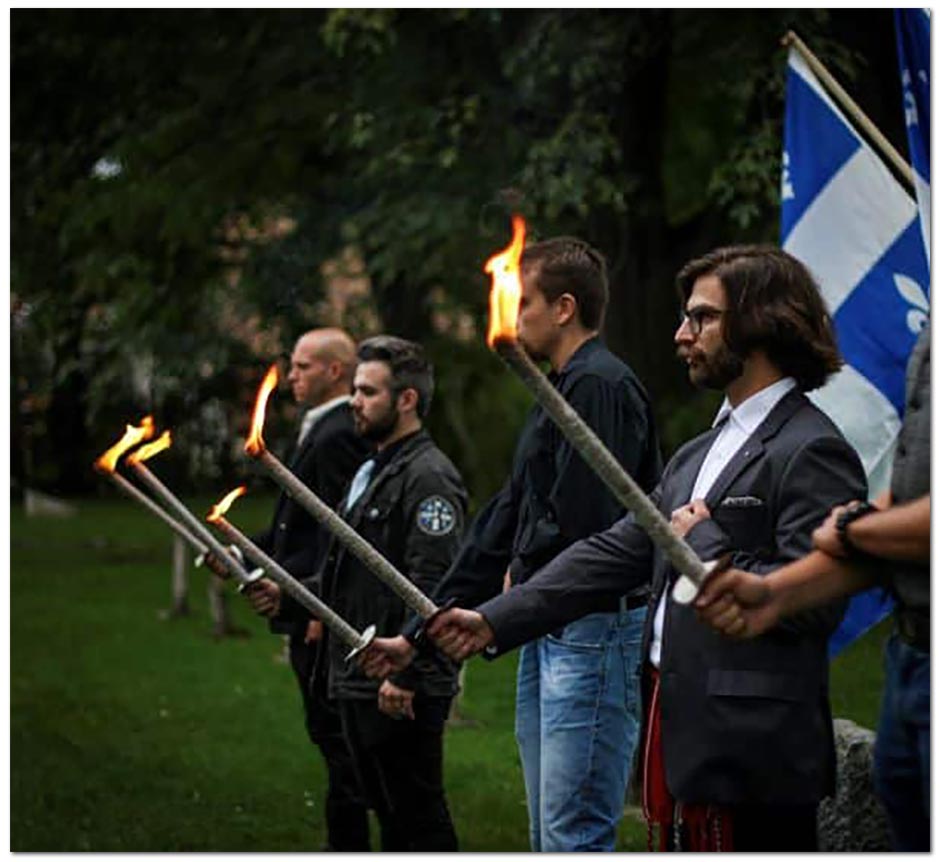
Ceremony honouring Montcalm (Photo from the group’s Facebook page)
The commemorations held at historic monuments, along with the posters and banners, bring to mind the actions of the far-right Québec organization Atalante. It’s also hard not to think of the tiki torch march held during the Unite the Right protests in Charlottesville in 2017, the same event in which a young antifascist woman was killed by a neo-Nazi.
“We were aware of it in advance, and it’s exactly what happened,” stated Gervais. “We were criticized for using the torches.” He believes that the torches served to “represent the proper gravity of the moment.” He evoked the use of torches in marches against Apartheid in South Africa and the image of the celebrated Olympic flame. For Gervais, the use of smoke bombs, torches and other pyrotechnics “isn’t limited to the far-right. That’s an idea that we reject; we reject it completely.”
For political scientist Jean-Pierre Couture, this imagery is drawn from a fascistic aesthetic or, at the very least, clearly evokes it. “From an objective point of view, if that isn’t the impression they intended to give, the connotations inherent in the image are extremely awkward.”
He believes that NA is playing a game of hide and seek that involves sending out signals and then turning the burden of proof over to those who criticize them. According to Couture, “they send very clear signals and then backpedal. But, in the end, they reach their target. They recruit those who understand and then seek to fool the unwary.”
“The far-right has always advanced through this kind of manipulation,” he concluded.
Our journalism is powered by readers like you.
We’re an award-winning non-profit news organization that covers topics like social and economic inequality, big business and labour, and right-wing extremism.
Help us build so we can bring to light stories that don’t get the attention they deserve from Canada’s big corporate media outlets.
Donate

